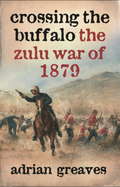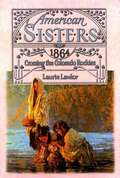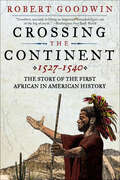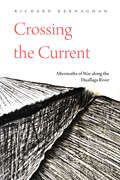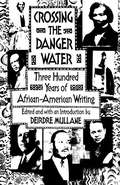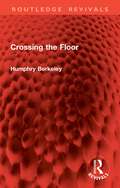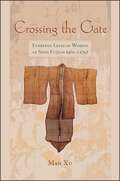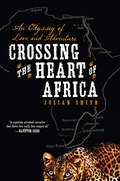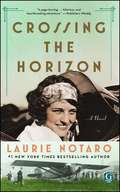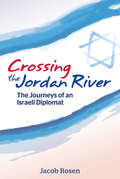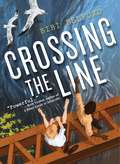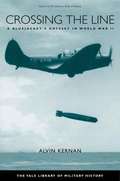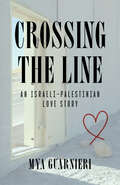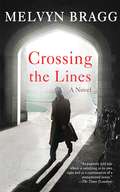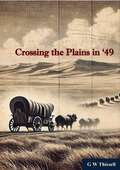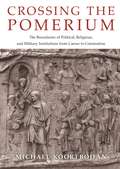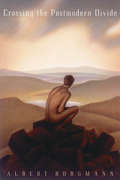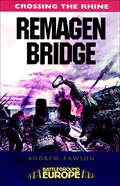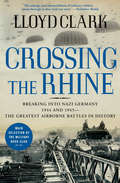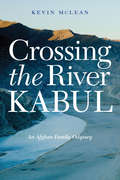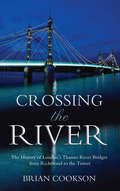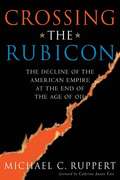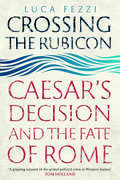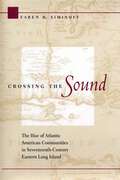- Table View
- List View
Crossing the Buffalo: The Zulu War of 1879
by Adrian GreavesA new and complete history of Zululand, and its destruction at the hands of the British in 1879.This book is not only a complete history of the Zulus but also an account of the way the British won absolute rule in South Africa.In the early decades of the nineteenth century, Shaka Zulu established a nation in south-east Africa which was to become the most politically sophisticated and militarily powerful black nation in the entire area. Although the Zulus never had any quarrel with their British neighbours, the rulers of the Cape Colony could not conceive of them as anything but a threat. In 1879, under dubious pretences, the British finally crossed the Buffalo River, and embarked on a bloody war that was to rock the very foundations of the British Empire.The story is studded with tales of incredible heroism, drama and atrocity on both sides: the Battle of Isandlwana, where the Zulus inflicted on the British the worst defeat a modern army has ever suffered at the hands of men without guns; Rorke's Drift, where a handful of British troops beat off thousands of Zulu warriors and won a record 11 VCs; and Ulundi, where the Zulus were finally crushed in a battle that was to herald some of the most shameful episodes in British Colonial history.Comprehensive, vast in scope, and filled with original and up-to-date research, this is a book that is set to replace all standard works on the subject.
Crossing the Colorado Rockies 1864 (American Sisters)
by Laurie LawlorWagon West! As the Civil War rages, the Hitchcocks head west to Pike's Peak. They've left their Pennsylvania home far behind as they ascend the Rocky Mountains, certain they'll find gold! Thirteen-year-old Eda keeps a secret journal as they travel through hostile Ute country and finally find shelter in a broken-down cabin. With scant food and only howling wolves for company, everything seems strange and frightening until Eda's seventeen-year-old sister Belle gets a job teaching, and Eda and her oldest sister Lucy meet an unusual but friendly family of actors. Eda and her sisters are beginning to settle in when Pa decides the family should return home. But as they travel down out of the high country, they meet with near-tragedy and are forced to stay in rough-and-tumble Denver. Here, penniless and freezing, they're herded into a tent city with nothing left of their former lives but a few clothes and tattered memories. That's when she meets an "enemy" who teaches her the most important lesson she'll ever learn. . . .
Crossing the Continent 1527–1540: The Story of the First African in American History
by Robert Goodwin"...an adventure story more thrilling than Defoe or Melville could have imagined."--The Philadelphia Inquirer The true story of America's first great explorer and adventurer—an African slave named Esteban DorantesCrossing the Continent takes us on an epic journey from Africa to Europe and America as Dr. Robert Goodwin chronicles the incredible adventures of the African slave Esteban Dorantes (1500-1539), the first pioneer from the Old World to explore the entirety of the American south and the first African-born man to die in North America about whom anything is known. Goodwin's groundbreaking research in Spanish archives has led to a radical new interpretation of American history—one in which an African slave emerges as the nation's first great explorer and adventurer.Nearly three centuries before Lewis and Clark's epic trek to the Pacific coast, Esteban and three Spanish noblemen survived shipwreck, famine, disease, and Native American hostility to make the first crossing of North America in recorded history. Drawing on contemporary accounts and long-lost records, Goodwin recounts the extraordinary story of Esteban's sixteenth-century odyssey, which began in Florida and wound through what is now Alabama, Mississippi, Louisiana, Texas, New Mexico, and Arizona, as far as the Gulf of California. Born in Africa and captured at a young age by slave traders, Esteban was serving his owner, a Spanish captain, when their disastrous sea voyage to the New World nearly claimed his life. Eventually he emerged as the leader of the few survivors of this expedition, guiding them on an extraordinary eight-year march westward to safety.Filled with tales of physical endurance, natural calamities, geographical wonders, strange discoveries, and Esteban's almost mystical dealings with Native Americans, Crossing the Continent challenges the traditional telling of our nation's early history, placing an African and his relationship with the Indians he encountered at the heart of a new historical record.
Crossing the Current: Aftermaths of War along the Huallaga River
by Richard KernaghanIn contemporary accounts of the Shining Path insurgency and Peru's internal war, the Upper Huallaga Valley has largely been overlooked—despite its former place as the country's main cocaine-producing region. From afar, the Upper Huallaga became a political and legal no-man's-land. Up close, vibrant networks of connection endured despite strict controls on human habitation and movement. This book asks what happens to such a place once prolonged conflict has ostensibly passed. How have ordinary encounters with land, territory, and law, and with the river that runs through them all, been altered in the aftermaths of war? Gathering stories and images to render the experiences of transportation workers who have ferried passengers and things across and along the river for decades, Richard Kernaghan elaborates a notion of legal topographies to understand how landscape interventions shape routes, craft territories, and muddle temporalities. Drawing on personal narratives and everyday practices of transit, this ethnography conveys how prior times of violence have silently accrued: in bridges and roads demolished, then rebuilt; in makeshift moorings that facilitate both licit and illegal trades; and above all through the river, a liquid barrier and current with unstable banks, whose intricate mesh of tributaries partitions terrains now laden with material traces and political effects of a recent yet far from finished past.
Crossing the Danger Water: Three Hundred Years of African-American Writing
by Deirdre MullaneThe history of African-American life and thought presented in this anthology represents a far-reaching written and oral tradition, which is thought-provoking, inspiring, and impressive in its breadth. It includes poetry and prose by today's best and most well-known writers.
Crossing the Floor (Routledge Revivals)
by Humphry BerkeleyOriginally published in 1972, this book is an account of the events which led Humphry Berkeley to join the Labour Party after seven years a Conservative Member of Parliament and twenty years as a member of the Conservative Party. Starting with his own political origins he shows the consistency of his internationalist and humanitarian philosophy against the background of the issues with which he was most concerned: abroad – Africa, the Commonwealth, the United Nations; at home – immigration, race, social reform. During his political career the author came into close contact with may of the leading figures of British politics and the book devotes chapters to a personal view of Macmillan, Butler, Macleod, Heath and Wilson. The book gives a vivid picture of UK political life in the 20th Century and illustrates the character of each of the 2 main Parties, showing also the conflicts facing a politician fighting to retain both his persona integrity and the means to play a leading role in Party politics.
Crossing the Gate: Everyday Lives of Women in Song Fujian (960-1279) (SUNY series in Chinese Philosophy and Culture)
by Man XuIn Crossing the Gate, Man Xu examines the lives of women in the Chinese province of Fujian during the Song dynasty. Tracking women's life experience across class lines, outside as well as inside the domestic realm, Xu challenges the accepted wisdom about women and gender roles in medieval China. She contextualizes women in a much broader physical space and social network, investigating the gaps between ideals and reality and examining women's own agency in gender construction. She argues that women's autonomy and mobility, conventionally attributed to Ming-Qing women of late imperial China, can be traced to the Song era. This thorough study of Song women's life experience connects women to the great political, economic, and social transitions of the time, and sheds light on the so-called "Song-Yuan-Ming transition" from the perspective of gender studies. By putting women at the center of analysis and by focusing on the local and the quotidian, Crossing the Gate offers a new and nuanced picture of the Song Confucian revival.
Crossing the Heart of Africa: An Odyssey of Love and Adventure
by Julian SmithBanff Award Winner: “Like David Grann’s The Lost City of Z, this is two stories, of an explorer and of the author’s search for him, and both are compelling.” —Library JournalIn 1898 the dashing British adventurer Ewart “the Leopard” Grogan fell head-over-heels in love—but before he could marry, he needed the approval of his beloved’s skeptical aristocratic stepfather. Grogan, seeking to prove his worth and earn her hand, set out on an epic quest to become the first man to walk the entire length of Africa, from Cape Town to Cairo, a feat, as the New York Times put it, “hitherto thought by many explorers to be impossible.” A little more than a century later, American journalist Julian Smith also found himself madly in love with his girlfriend of seven years . . . but terrified by the prospect of marriage. Inspired by Grogan’s story, which he discovered by chance, Smith decided to face his fears of commitment by retracing the explorer’s amazing—but now forgotten—4,500-mile journey for love and glory through Africa. Crossing the Heart of Africa is the unforgettable account of these twin adventures, as Smith beautifully interweaves his own contemporary journey with Grogan’s larger-than-life tale of cannibal attacks, charging elephants, deadly jungles, and romantic triumph.“Not only a modern-day travelogue, but also a great historical account of a charming trailblazer, and the story of a modern-day relationship.” —Miami Herald“Smith, a talented travel writer . . . evokes Grogan, his adventures, and his world with both insight and panache . . . and matchless skill.” —The Washington Post“A rapturous adventure narrative that shows love really does conquer all.” —Hampton Sides, New York Times–bestselling author of In the Kingdom of IceGold Prize Winner, Society of American Travel Writers Western Writing AwardsBanff Mountain Book Competition Winner, Special Jury MentionAmerican Society of Journalists and Authors Award Winner: Best Book (Memoir)
Crossing the Horizon: A Novel
by Laurie NotaroSoar back to the fearless 1920s with #1 New York Times bestselling writer Laurie Notaro—beloved author of The Idiot Girls’ Action Adventure Club—in a “captivating historical” (Kirkus Reviews) novel that tells the true, little-known story of three aviatrixes in a race to be the first woman to fly across the Atlantic.It’s 1927. Charles Lindberg has inspired millions but no woman has yet embarked on trans-Atlantic flight. Three women, based on real aviatrixes from the early years of aviation, determine to make their mark on history and set out on a thrilling but dangerous mission. Elsie Mackay, daughter of an Earl, is the first Englishwoman to get her pilot’s license. Mabel Boll, a glamorous society darling and former cigar girl, is ardent to make the historic flight. Beauty pageant contestant Ruth Elder uses her winnings for flying lessons and becomes the preeminent American girl of the sky. Inspired by true events and real people, Notaro vividly evokes this exciting time as her determined heroines vie for the record. Through striking photos, meticulous research, and atmospheric prose, Notaro brings Elsie, Mabel, and Ruth to life, pulling us back in time as the pilots collide, struggle, and literally crash in the chase for fame and a place in aviation history.
Crossing the Jordan River: The Journeys of an Israeli Diplomat
by Jacob RosenJacob Rosen writes in this fascinating and illuminating book about his experiences in both Cairo, Egypt and Amman, Jordan as an Israeli Diplomat. <P><P>He has learned a great deal about Egyptian and Jordanian societies and also more about the Israeli character. Time and again, Mr. Rosen witnessed how Arabs and Western Cultures simply do not understand each other. The vignettes assembled in this book are based on real events. Mr. Rosen makes each of these stories stand on its own merit. The approach is anthropological, rather than political, and maybe through sharing these stories, this book can explain why and how the Arabs and the Israelis (and perhaps the West) fail to understand one another. They also show that after all is said and done, we are human beings who share the same concerns and inspirations.
Crossing the Line
by Bibi BelfordFor readers of The Lions of Little Rock and P. S. Be Eleven, an award-winning middle grade novel inspired by the true events leading up to the 1919 Chicago race riots.Some people think there’s a line, and if everybody stays on their side of the line, then we’ll all get along just fine. That’s what Billy’s da told him, back before he joined up in the Great War. Da said that sometimes, to do what’s right, you gotta cross that line. Course, that was before the war ended and Billy’s da came home with shell shock. Now it’s up to Billy to be man of the house, to take care of his ma and sisters and work at the docks when he can. He ain’t no coward, and he don’t complain, not even when money troubles mean he has to change schools. It’s hard times for all the Irish—maybe even for all of Chicago. And it gets harder when Billy becomes friends with Foster, a black boy who loves baseball and whose daddy went to war, too. What seems like just horsing around to them—building a raft, spending time in their secret hideout by the creek—stirs up trouble when the rest of the city gets wind of it. Soon, the boys’ friendship has triggered a series of events that will change both their lives forever. And with racial tensions in the city coming to a head, Billy must decide once and for all what it means to be courageous, to be a friend, and to truly cross the line.
Crossing the Line: A Bluejacket's Odyssey in World War II
by Alvin B. KernanIn this memoir of life aboard aircraft carriers during World War II, Alvin Kernan combines vivid recollections of his experience as a young enlisted sailor with a rich historical account of the Pacific war. Kernan served in many battles and was aboard the Hornet when it was sunk by torpedoes in the Battle of the Santa Cruz Islands. "One of the most arresting naval autobiographies yet published."--Sir John Keegan. "An honest story of collective courage, evocative, well-written, and fixed before the colors fade."--Kirkus Reviews. "[Kernan] recounts a wonderful and exciting American story about a poor farm boy from Wyoming who enlisted in the Navy. ... [He] has written eight other books. I will go back and read them all."--John Lehman, Air & Space. "Details ... make the moment vivid; that is what it was like, on the Hornet in its last hours."--Samuel Hynes, New York Times Book Review.
Crossing the Line: An Israeli-Palestinian Love Story
by Mya GuarnieriIn Crossing the Line, journalist and writer Mya Guarnieri recounts the story of a real-life Romeo and Juliet: herself, a Jewish American immigrant to Israel lecturing at a Palestinian university, and Mohamed, a fellow journalist and the son of a member of the Palestine Liberation Organization.This timely memoir chronicles how, despite the Israeli-built separation barrier that stood between them, Mya and Mohamed managed to meet, fall in love, and overcome the external and internal obstacles that threatened to keep them apart. With a reporter's eye for detail and a storyteller's knack for nuance, she shares the political, cultural, and family problems the star-crossed lovers faced throughout their courtship. Crossing the Line is not only a reflection on her own story, however; this compelling memoir also offers an intimate look at daily life in Palestinian areas of the Israeli-occupied West Bank; it explores the complexity of loving one's "enemy"; and it serves as a tortured love letter to the land and the people who call the place home.In a dark moment in the long history of the conflict between Israelis and Palestinians, Crossing the Line is a spot of light that imagines a different future for the two peoples. It is also a universal story about the challenges of overcoming our innermost emotional barriers and making ourselves vulnerable to love.
Crossing the Lines: A Novel
by Melvyn BraggFollowing The Soldier's Return, heralded as "a novel written in fine steel sentences and granite paragraphs" by the Washington Post, and the equally brilliant A Son of War, Melvyn Bragg brings "one of the finest sagas of postwar Britain" (London Sunday Telegraph) to a stunning conclusion. Set in the 1950s, this absorbing novel follows the intertwined fates of people crossing boundaries in their lives. Alive with a wide cast of characters, Crossing the Lines vividly portrays the spirit and atmosphere of the mid-century and the profound changes taking place at the time, in morals, religion, music, and social class. Moving and evocative, this masterly novel and the two that have preceded it are rightfully hailed as contemporary classics.
Crossing the Pass of Clouds: An Army Photographer's Vietnam Journal
by Lon HolmbergCrossing the Pass of Clouds: An Army Photographer’s Vietnam Journal is an intimate portrait of the last years of the Vietnam War in 147 black-and-white pictures and a series of vignettes written by photographer Lon Holmberg. As the photographer for American Commanding General Creighton Abrams, Holmberg had the opportunity to document pivotal moments involving a range of influential historical figures. Among the many remarkable images Holmberg has captured are photographs of South Vietnamese President Nguyen Van Thieu, US Secretary of Defense Melvin Laird, and National Security Advisor Henry Kissinger during his journey to China, a trip that paved the way for President Nixon’s historic visit the following year. In Crossing the Pass of Clouds, Holmberg presents a captivating and deeply personal account of his experiences during his service as an army photographer in Vietnam in 1971. Through a combination of vivid narration and poignant images, this memoir provides an intimate glimpse into the complexities of the Vietnam War and its aftermath, both for the country and for the narrator. Holmberg recounts his assignment in the Ashau Valley in the north (a significant infiltration route for the North Vietnamese Army); a daring reconnaissance mission across the border in Laos; and his time at a firebase in central Vietnam near the enigmatic Hai Van Pass (known in English as the Pass of Clouds). Yet even as Holmberg’s photographs look squarely at the realities of war, they also explore beyond it, illuminating the faded elegance of Saigon, the lives of indigenous communities and of farmers working in fields, and the eventual transition of Vietnam into an industrialized society.
Crossing the Plains in '49
by G W ThissellCrossing the Plains in '49 by G. W. Thissell is a riveting firsthand account of one of the most adventurous and challenging journeys in American history. Set during the height of the California Gold Rush, this memoir chronicles Thissell's arduous trek across the vast and treacherous plains of the American West in 1849.Thissell's narrative offers a vivid portrayal of the hardships, dangers, and triumphs experienced by the thousands of pioneers who dared to venture westward in search of fortune and a new life. From the moment they set out, Thissell and his fellow travelers faced relentless challenges: unpredictable weather, scarce resources, disease, and the constant threat of attack. His detailed observations and candid reflections provide an authentic glimpse into the daily struggles and indomitable spirit of these early pioneers.Through Thissell's eyes, readers are transported to the untamed landscapes of the mid-19th century, experiencing the raw beauty and harsh realities of the journey. His descriptions of the diverse terrains, from the expansive plains to the rugged mountains, capture the essence of the American frontier. Alongside the physical challenges, Thissell also delves into the camaraderie, conflicts, and resilience of the people he traveled with, painting a comprehensive picture of life on the trail.Crossing the Plains in '49 is more than just a travelogue; it is a testament to the perseverance and determination that defined the American spirit during a time of great exploration and expansion. Thissell's engaging storytelling and keen insights make this book an essential read for history enthusiasts, scholars, and anyone fascinated by the Gold Rush era and the epic journeys that shaped the nation's history.This memoir stands as a significant historical document, preserving the voices and experiences of those who embarked on one of the most perilous migrations in American history. Thissell's account is a valuable contribution to our understanding of the pioneer experience, offering readers a powerful reminder of the courage and endurance required to cross the plains in '49.
Crossing the Pomerium: The Boundaries of Political, Religious, and Military Institutions from Caesar to Constantine
by Michael KoortbojianA multifaceted exploration of the interplay between civic and military life in ancient RomeThe ancient Romans famously distinguished between civic life in Rome and military matters outside the city—a division marked by the pomerium, an abstract religious and legal boundary that was central to the myth of the city's foundation. In this book, Michael Koortbojian explores, by means of images and texts, how the Romans used social practices and public monuments to assert their capital's distinction from its growing empire, to delimit the proper realms of religion and law from those of war and conquest, and to establish and disseminate so many fundamental Roman institutions across three centuries of imperial rule.Crossing the Pomerium probes such topics as the appearance in the city of Romans in armor, whether in representation or in life, the role of religious rites on the battlefield, and the military image of Constantine on the arch built in his name. Throughout, the book reveals how, in these instances and others, the ancient ideology of crossing the pomerium reflects the efforts of Romans not only to live up to the ideals they had inherited, but also to reconceive their past and to validate contemporary practices during a time when Rome enjoyed growing dominance in the Mediterranean world.A masterly reassessment of the evolution of ancient Rome and its customs, Crossing the Pomerium explores a problem faced by generations of Romans—how to leave and return to hallowed city ground in the course of building an empire.
Crossing the Postmodern Divide
by Albert BorgmannIn this eloquent guide to the meanings of the postmodern era, Albert Borgmann charts the options before us as we seek alternatives to the joyless and artificial culture of consumption. Borgmann connects the fundamental ideas driving his understanding of society's ills to every sphere of contemporary social life, and goes beyond the language of postmodern discourse to offer a powerfully articulated vision of what this new era, at its best, has in store. "[This] thoughtful book is the first remotely realistic map out of the post modern labyrinth."—Joseph Coates, The Chicago Tribune "Rather astoundingly large-minded vision of the nature of humanity, civilization and science."—Kirkus Reviews
Crossing the Rhine: 9th Armoured Infantry Division (Battleground Europe)
by Andrew RawsonIn Spring 1945 one final hurdle faced the American and British Armies under Ike's supreme command - the Rhine. This mighty river was literally the last ditch for the defence of Hitler's Germany. Crossing it would be a major military undertaking. The race was on to find intact crossings that could save many lives and precious time.Famously the American forces in a daring coup-de-main operation seized the Bridge at Reagen which due to German blunder and oversight remained intact.This is the thrilling story of that success.
Crossing the Rhine: Breaking into Nazi Germany 1944 and 1945—The Greatest Airborne Battles in History
by Lloyd Clark“The fighting spirit of Allied paratroopers comes through with exciting clarity” in this account of two separate invasions of Germany in World War II (Kirkus Reviews).A main selection of the Military Book Club In September 1944, as the Allies drove across Europe after Normandy, British field marshal Bernard Montgomery launched Operation Market Garden to secure the lower Rhine—Germany’s last great natural barrier in the west—and passage to Berlin. Though Allied soldiers outnumbered Germans two to one, they suffered devastating casualties and were forced to retreat. Then, in March 1945, Montgomery orchestrated another airborne attack on the Rhine, called Operation Plunder. This time the Allies overwhelmed the German defenses, secured the eastern bank, and began their final march into the heart of the Third Reich. Including detailed maps and personal accounts from those on both sides of the battle, this “vivid war story” examines Allied attempts to breach Germany’s borders, and illustrates how lessons learned from failure helped form the second plan of attack—and seal Germany’s defeat (Publishers Weekly).
Crossing the River Kabul: An Afghan Family Odyssey
by Kevin McLeanBaryalai Popal sees his Western-educated professors at Kabul University replaced by communists. He witnesses his classmates “disappearing.” The communist takeover uproots Popal from his family and home. Thus begins Crossing the River Kabul, the true story of Popal’s escape from Afghanistan and his eventual return. Kevin McLean weaves together Popal’s stories in this memoir, which is also a fascinating look at Afghanistan from the viewpoint of Popal and generations of his politically influential family. From the exile of Popal’s grandfather from Kandahar in 1898 to his father’s tutoring of two boys who as adults would play important roles in Afghanistan—one as king and the other as president—to his uncle’s presence at the fateful meeting that led to the Soviet invasion of Afghanistan, Popal’s family history is intertwined with that of his nation. Popal fled his country following the Russian invasion of Afghanistan in 1980. After being imprisoned as a spy in Pakistan, he managed to make his way to Germany as a refugee and to the United States as an immigrant. Twenty years later he returned to Afghanistan after 9/11 to reclaim his houses, only to find one controlled by drug lords and the other by the most powerful warlord in Afghanistan. Popal’s memoir is an intimate, often humorous portrait of the vanished Afghanistan of his childhood. It is also the story of a father whose greatest desire is to see his son follow in his footsteps, and a son who constantly rebels against his father's wishes. Crossing the River Kabul is a story of choice and destiny, fear and courage, and loss and redemption.
Crossing the River: The History of London's Thames River Bridges from Richmond to the Tower
by Brian CooksonSome of the most beautiful views of London are those from the many bridges which span the River Thames. Millions of people cross over the Thames every day but most are too concerned with reaching their destination to notice the structures they use, let alone consider their history or the risks taken in building them. Triumphs of architecture and engineering, London's bridges have inspired artists as diverse as Dickens and Monet. From the elegant Richmond Bridge to the Gothic, quintessentially British Tower Bridge, they have formed the backdrop to battles, rebellions, pageantry and mysteries for two millennia. Crossing the River tells these stories, including the assassination of a dissident with a poisoned umbrella on Waterloo Bridge; the apparent suicide of 'God's banker', an Italian financier with links to the Vatican, the Masons and the Mafia; and the Marchioness tragedy and its controversial aftermath. Featuring illustrations and photographs old and new, this book will undoubtedly increase the reader's knowledge and appreciation of the bridges and the people who built them, and thereby enhance the pleasure of seeing them, whether at leisure or stuck in a traffic jam.
Crossing the Rubicon
by Michael C RuppertThe Rubicon signifies a point of no return. Peak Oil and 9/11 are two such points that signal so profound a change in the course of world events that no one will remain unaffected. The attacks of September 11, 2001 were accomplished through an amazing orchestration of logistics and personnel. Crossing the Rubicon discovers and identifies key suspects - finding some of them in the highest echelons of American government - by showing how they acted in concert to guarantee that the attacks produced the desired result. A superbly detailed scrutiny of the events of 9/11, the book also ranges across the terrain of rapidly diminishing hydrocarbon energy supplies, geopolitics, narco-traffic, intelligence and militarism - without which 9/11 cannot be understood. Crafted as a criminal investigation of a homicide, Crossing the Rubicon examines: * the motives for the 9/11 attacks, including the Pentagon's need for a pretext for war that would enable an all-out drive for the planet's last reserves of oil and gas; Wall Street's need for liquid cash from restored traffic in Afghani heroin; and the administration's need for legal domestic repression during severe and imminent resource shortages; * the personnel, including Dick Cheney, the Pakistani Intelligence Agency (ISI), the Taliban, al Qaeda, the bin Ladens and elements of the government of Saudi Arabia: * the intelligence, including covert software, the full complexity of the US intelligence community, the connections with Wall Street and the Israeli government; * the carefully designed opportunity on the day of the attacks, the role of the Secret Service and the US Vice President: * the coverup; and * the outcome: "The War on Terror" as pretext for the loss of US civil liberties and domination of world oil reserves. ...at the end of three years of conducting a really independent investigation, Ruppert is not only heading in the right direction, but also touching the inner sanctum of the hidden government agenda. --Andreas von Bulow, former German Cabinet Minister & Parliamentary Secretary MICHAEL RUPPERT is the Publisher/Editor of From the Wilderness, a newsletter read by more than 16,000 subscribers in 40 countries. A former LAPD narcotics investigator, he is widely known for his groundbreaking stories on US involvement in the drug trade, Peak Oil and 9/11.
Crossing the Rubicon: Caesar's Decision and the Fate of Rome
by Luca FezziA dramatic account of the fateful year leading to the ultimate crisis of the Roman Republic and the rise of Caesar&’s autocracy When the Senate ordered Julius Caesar, conqueror of Gaul, to disband his troops, he instead marched his soldiers across the Rubicon River, in violation of Roman law. The Senate turned to its proconsul, Pompey the Great, for help. But Pompey&’s response was unexpected: he commanded magistrates and senators to abandon Rome—a city that, until then, had always been defended. The consequences were the ultimate crisis of the Roman Republic and the rise of Caesar&’s autocracy. In this new history, Luca Fezzi argues that Pompey&’s actions sealed the Republic&’s fate. Drawing on a wide range of primary sources, including Cicero&’s extensive letters, Fezzi shows how Pompey&’s decision shocked the Roman people, severely weakened the city, and set in motion a chain of events that allowed Caesar to take power. Seamlessly translated by Richard Dixon, this book casts fresh light on the dramatic events of this crucial moment in ancient Roman history.
Crossing the Sound: The Rise of Atlantic American Communities in Seventeenth-Century Eastern Long Island
by Faren R. SiminoffIn seventeenth-century North America, communities on eastern Long Island were an integral part of the tumultuous and dynamic New England region and the larger Atlantic American world. They were created and modified by ideas and traditions that were inherent to life in Atlantic America and were not simply imported from Europe or established solely by settlers and imposed on native peoples. In Crossing the Sound Faren R. Siminoff skillfully weaves new data with sophisticated theoretical analysis to demonstrate that the development of eastern Long Island was based more on complex interactions between settlers and native peoples than on clashes between the two groups. English and Dutch colonists did not merely transport traditional systems of land ownership, political organizations, and control of economic resources to the Northeast. Rather, both settlers and natives underwent a process of negotiation, resulting in a hybrid society that adapted and reworked new and old patterns of life, highlighting the lasting influence of native communities on the emerging American identity. This compelling case study adds new layers to the history of the Atlantic world: it becomes a story without a dominant voice or community at its core, demonstrating that neither monolithic groups nor static interests prevailed in the region. Crossing the Sound offers a fresh interpretation of colonial relationships tracing social, cultural, and political exchanges between groups.
